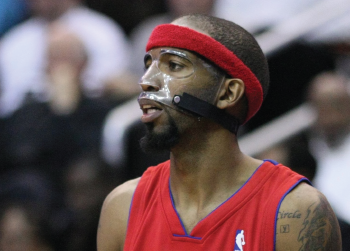For James Kearney, MD, an interaction with professional athletes began as it does for most people: with passion, but from a distance. In 1974, the Philadelphia Flyers, his hometown hockey team, won the Stanley Cup, sparking city-wide euphoria.
Explore This Issue
April 2019“One of my enduring childhood memories was going out in front of my house when the Flyers won the Stanley Cup … and cars were beeping, people were jubilant,” Dr. Kearney said. “It was the first championship in Philadelphia in a long, long time, and the entire city had rallied behind the Flyers, who are a gritty bunch of players that Philadelphia could really identify with. From then on, I was a hockey fan.”
Now, Dr. Kearney, chairman of otorhinolaryngology at Pennsylvania Hospital of the University of Pennsylvania Health System, treats members of the Flyers team for otolaryngology conditions. As a physician, his interaction with the world-class athletes is much different than the connection he had with them when he was young. In the exam room, he’s no longer at a distance. He’s close up.
When it comes to being a fan, though, Dr. Kearney stays relatively dispassionate. A friendly remark about a recent game might be OK, but autograph seeking is not. Otolaryngologists who treat professional athletes say that, while they are aware of the stakes that are involved, a crucial part of the job is treating professional athletes as they would other people—as patients first.
They also emphasize availability and, when necessary, discretion. “You can’t let the celebrity aspect of it overwhelm your willingness to take care of this individual as a human being who needed your help as a physician and not as somebody who is a public figure,” said Dr. Kearney, who also provided care for the Philadelphia Eagles football team for two decades until 2018. “You need to treat them as real human beings.”
Medical Conditions

Pro athletes frequently need custom-made protective masks so that they can continue to play while facial injuries heal.
© Wikipedia/Keith Allison
In terms of the care provided, there is a lot of overlap between professional athletes and other patients, otolaryngologists say. While a hockey or basketball player might be more likely than an average patient to come in with a laceration or a facial bone fracture, otolaryngologists typically see conditions that are run-of-the-mill—from sinus infections to chronic tonsillitis to earwax build-up.
“Most of the injuries or problems I see in these patients are not something that is an injury or a condition unique to a professional athlete,” said Christopher Larsen, MD, associate professor of general otolaryngology at the University of Kansas, who provides care for the Kansas City Royals baseball team and Kansas City Chiefs football team. “It’s more common conditions that every human being gets; it just so happens that it’s occurring in a professional athlete.” For these conditions, athletes receive the same treatment as most other patients would, otolaryngologists say.
Dr. Larsen said he screens baseball players for oral cancer, provides antihistamines for allergies, chooses topical steroid spray or surgery for swollen turbinates, and performs routine sinus, nasal, and throat surgeries on players who fail maximal medical management.
Many football players, and some baseball players, struggle with snoring and obstructive sleep apnea (OSA), which interrupts sleep and can have a big effect on focus and performance, he said. But in his experience, professional athletes struggle just as much with adherence to and tolerance of continuous positive airway pressure (CPAP) for OSA as other patients do.
During spring training, some players on the Royals team develop nosebleeds because they are unaccustomed to the dryness of the Arizona desert air, he said.
Pro athletes frequently need custom-made protective masks so that they can continue to play while facial injuries heal, and at Detroit’s Henry Ford Health System, some of their faces are pre-scanned so that the 3D printing process for the masks can be started right away, said Lamont Jones, MD, MBA, vice chair of otolaryngology, head and neck surgery at the Henry Ford, who treats members of the Detroit Pistons basketball team, Detroit Lions football team, and Detroit Tigers baseball team.